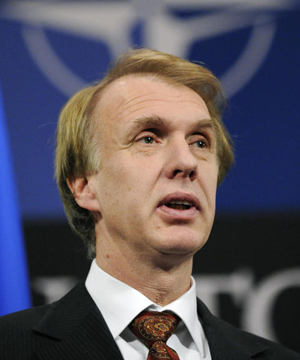
Ukrainian-Russian Diplomatic War Intensifies
Publication: Eurasia Daily Monitor Volume: 6 Issue: 158
By:

On August 10 President Dmitry Medvedev accused President Viktor Yushchenko of taking Ukraine on an "anti-Russian course" (www.blog.kremlin.ru, August 10). Moscow also recently engaged in tit-for-tat diplomatic expulsions (EDM, July 31). The two Ukrainian diplomats expelled were Ukraine’s General-Consul in St.Petersburg Natalia Prokopovych and Oleh Voloshyn a senior adviser to the Ukrainian Ambassador in Moscow. Russia claimed that this was in response to the "unfriendly actions of the Ukrainian authorities" towards two Russian diplomats. It regarded Kyiv’s actions as an "openly anti-Russian step which harms the development of relations between Russia and Ukraine" (www.mid.ru, July 29).
Ukraine’s Foreign Ministry (MZS) and National Security and Defense Council (NRBO) both expressed their surprise over the Russian response. "We are very surprised at such a severe and unfortunate reaction by the Russian side," the MZS stated (www.mfa.gov.ua, July 29). The MZS had provided to its Russian counterparts a dossier of documents outlining the undiplomatic activities of the two expelled Russian diplomats. "On the question of the Russian ambassador’s adviser it was tied to his openly anti-Ukrainian statements as well as the Odessa General-Consul and his de facto support for radical political forces" (www.mfa.gov.ua, July 29).
The two expelled Ukrainian diplomats had never been involved in undiplomatic activities and were not warned at any stage by Moscow. The MZS claimed that the two expelled Russian diplomats breached the 1961 Vienna Convention on Diplomatic Relations and had intervened in Ukraine’s internal affairs. First Deputy Head of the NRBO and former Foreign Minister Volodymyr Ohryzko described the Russian response as a return to "the tried and tested reactionary Soviet mentality of the Homo Sovieticus (sovkova) in responding to absolutely lawful actions by (the Ukrainian) state," Ohryzko commented (Ukrayinska Pravda, July 30).
On July 31 Ukrayinska Pravda was told by unofficial sources that the two "so-called diplomats," as Ohryzko described them, were involved in espionage and subversive activities. Odessa General-Consul Oleksandr Grachov financed and sought to cooperate with local political leaders by drawing on funds generated by illegal hard currency operations undertaken through shadow economic structures. This "illegal espionage activity in support of Russia’s political steps," sought to recruit "agents of influence" to advance Russian interests in Ukraine.
One of these controlled political groups was the Odessa-based Rodina Party, whose members were accused of the murder of a Ukrainian nationalist in Odessa in April (EDM, June 16). Grachov was directly subordinated to the Federal Security Service (FSB) leadership who passed his reports directly to Prime Minister Vladimir Putin (Ukrayinska Pravda, July 31). Grachov’s apartment, purchased with these illegally earned funds, was located in the same building in Odessa as Rodina Party leader Igor Markov’s office.
Expelled Senior Adviser Vladimir Lysenko undertook "active espionage and subversive activities in Ukraine," the same sources told Ukrayinska Pravda (July 31). "Lysenko established unofficial contacts with representatives of local organs of power with the aim of obtaining confidential information on Ukraine’s position in negotiations over the Black Sea Fleet" (Ukrayinska Pravda, July 31).
Lysenko also sought to recruit agents of influence among the Crimean Tatar community with the aim of replacing the leadership of the Medzhilis (Tatar unofficial parliament) with individuals of a more pro-Russian orientation. The Crimean Tatars have long been pro-Ukrainian in their orientation and Medzhilis leaders were elected to the national parliament within Rukh (1998) and the Our Ukraine bloc (2002, 2006, 2007).
A third area – long suspected of Russian diplomats – was their subversive activities with the FSB based in the Black Sea Fleet to sponsor "public protest actions," when for example, NATO vessels arrived in Sevastopol they organized protests in support of the Russian navy. Anti-NATO and anti-American protests began in earnest in the Crimea in summer 2005, immediately after Viktor Yushchenko was elected president. They were organized against Ukraine’s joint exercises within the framework of NATO’s Partnership for Peace (PfP). Moscow had not mobilized similar protests in the Crimea against these exercises in 1995-2004 under President Leonid Kuchma.
Russian leaders, Crimean communists and Crimean Russian nationalists have repeatedly warned that if Ukraine moved towards NATO membership that it would do so without the Crimea. This threat of using separatism to undermine a country’s Trans-Atlantic integration was implemented in Georgia in August 2008. Crimea has never been regarded, unlike Abkhazia or South Ossetia, as a frozen conflict. Nevertheless, the Ukrainian authorities are preparing for future conflict scenarios and, not coincidentally after the expulsion of Russian diplomats, a large-scale "anti-terrorist" exercise was held in the Crimea on August 3-7 organized by the Ukrainian Security Service (SBU)’s Anti-Terrorist Center.
The SBU "Alpha" unit, units from the ministry of emergency situations, interior ministry special forces and the Ukrainian navy’s marines worked together with the authorities during the planned exercises. The two-fold aim of the exercises was to ascertain the level of cooperation between the Ukrainian security forces and the authorities in the event of a "state of emergency" or "undertaking anti-terrorist operations" (www.sbu.gov.ua, July 28). Both scenarios involved countering hypothetical threats from "terrorists" (in this case, a euphemism for separatists).
Leaked information about Lysenko’s work with the FSB explains why the SBU last month demanded the withdrawal of the FSB from the Black Sea Fleet by December (EDM, July 14). The ostensible reason for the FSB being in Sevastopol is to provide security for the Black Sea Fleet. Judging from Ukrainian sources, this should be secondary to working with Russian diplomats in the fields of espionage or subversion. However, it remains unclear if Ukraine’s tougher line towards Russian espionage and subversion is a product of the election campaign to increase Yushchenko’s nationalistic credentials in Western Ukraine or growing Russian intelligence activities against Ukraine, or a combination of both.




